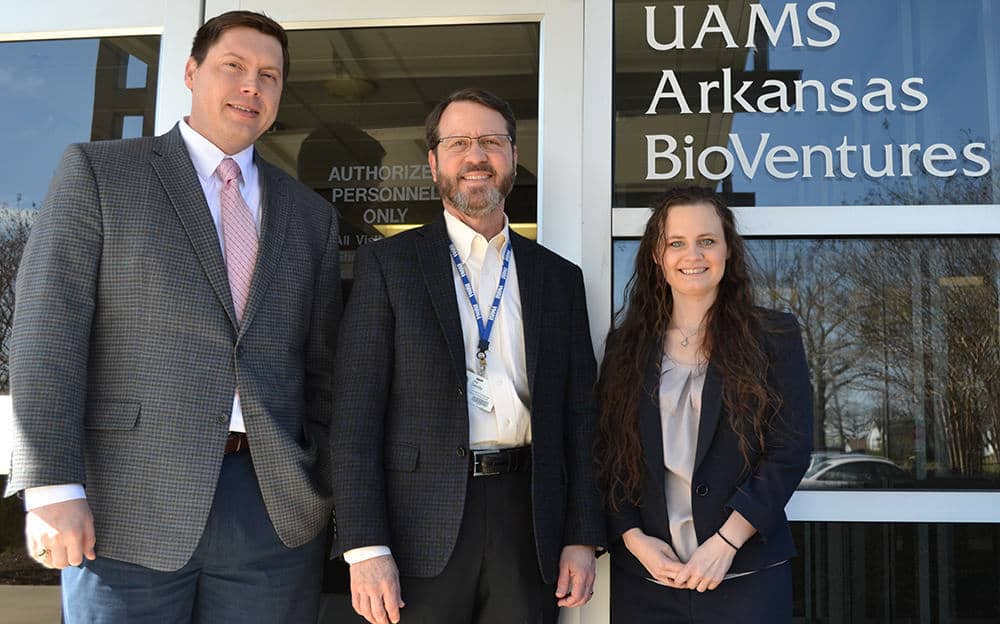Boot Camp, BioVentures Propel Researcher into Award-winning Business
| March 14, 2018 | Sometimes a motivation and an idea grounded in the academic world make the same journey and reach the same destination together. They did for Amanda Stolarz, Pharm.D., Ph.D. in 2016.
At the Entrepreneurship Boot Camp in the summer of 2016, Stolarz’s motivation to do purely academic research met up with an idea for a new way to reduce the side effects of chemotherapy that ultimately won an award and resulted in the formation of a new company, Rejuvenix Technologies.
“I did not like business,” Stolarz said. “I was not interested in business at all. I wanted to do academic research, clinically meaningful research. Dr. Nancy Rusch said, ‘You know, things don’t magically go from the bench to the clinic. There’s a commercialization process. To be a good scientist, you need to understand that process.’ So, as an academic exercise, I wanted to understand how my research would finally make it to a patient.”
Stolarz is a postdoctoral fellow and member of a research team led by Nancy Rusch, Ph.D. Rusch chairs the College of Medicine Department of Pharmacology and Toxicology and leads the educational efforts of the UAMS Translational Research Institute.
Rusch and Nancy Gray, Ph.D., director of BioVentures, worked together to secure the funding for the Entrepreneurship Boot Camp that Stolarz attended.
At the boot camp lead by University of Arkansas at Fayetteville’s (UAF) Carol Reeves, Ph.D., Stolarz became aware of a team of business students at UAF that needed someone to provide scientific expertise as part of an entrepreneurship course, and she joined them.
After pivoting from one promising idea that wasn’t yet mature enough for commercialization and examining several others, Joshua Phillips, a business student on the team, found a technology that looked to have potential.
“He called me up, and I immediately was excited about it,” Stolarz said. “My over-arching goal in my research is to treat and prevent the side effects of chemotherapy. This technology has the potential to reduce the side effects of a multitude of chemotherapeutic drugs.”
The technology being commercialized was developed as a collaboration between UAF and UAMS. The lead inventor is Daniel Fologea, Ph.D., formerly at UAF and now at Boise State University, who collaborated with Michael Borrelli, Ph.D., in the UAMS College of Medicine Department of Radiology. Fologea and Borrelli continue to play important roles as advisors to the Rejuvenix team, Stolarz said.
The technology is a radiation-triggered lipsome or ‘fat bubble,’ Stolarz said. Focused radiation is used to trigger the release of a drug or drugs encapsulated in the bubble after it enters the cancerous tumor environment. The technique sharply limits systemic exposure to chemotherapy because it only is released at the site of the tumor.
“You’re protecting the rest of the body from the toxic side effects because it’s more targeted,” Stolarz said. “It achieves the same goals I have been trying to achieve in my own research but in another way. The idea of using liposomes in chemotherapy is not new, but the type of liposome delivery here, that’s innovative. Before it was passive release, and they just slowly released drug over time. With this technology, you can get an active, rapid release of the drug.”
Because the idea has such strong potential, the team built a business plan around it with the support of the Arkansas Regional Innovation Hub’s I-Fund program, and their mentor Jay Gandy, Ph.D. The team entered the plan in and won the 2017 Donald W. Reynolds Governor’s Cup competition along with the $25,000 top prize.
With the successful discovery of the commercial potential of the liposomes, Rejuvenix Technologies chose to move forward. Phillips is Rejuvenix CEO, and Stolarz is the startup’s chief scientific officer.
Shortly thereafter the team added Gandy to the company to help lead the complicated regulatory effort and provide expertise in other areas needed for a startup Gandy also is chair of the Department of Environmental and Occupational Health in the UAMS College of Public Health.
Rejuvenix is applying for a Small Business Technology Transfer research grant from the National Cancer Institute for funding to test the idea in an experimental model.
The Entrepreneurship Boot Camp that Gray and BioVentures played a key role in organizing helped Stolarz start down the path to Rejuvenix, and they continue to assist the company. Stolarz said Gray has provided valuable advice to them along with letters of support in the company’s search for funds. UAF officials also have given them assistance.
Ultimately for Stolarz and Rejuvenix, the business is the means to do something more than just achieve success in the marketplace.
“One of the driving forces behind us is a set of facts,” Stolarz said. “About a third of cancer patients interrupt, change or stop therapy altogether because of the side effects of cancer treatment. We are so advanced medically that we should be able to treat cancer without killing the patient. That’s what this technology is striving to do, provide an option for patients to have cancer treatment without having to suffer these debilitating and damaging side effects.”
